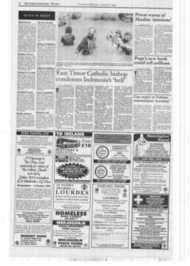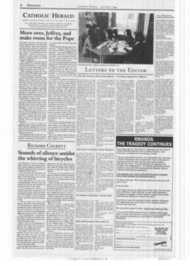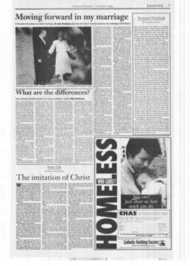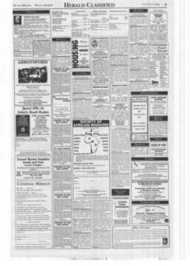Page 5, 22nd July 1994
Page 5

Report an error
Noticed an error on this page?If you've noticed an error in this article please click here to report it.
Tags
Share
Related articles
Catholics Welcome Release Of Suu Kyi
The Oil Giants Who Support A Killing Regime
Lord Alton Calls For The Release Of Jailed Burmese...
Burma's Leader A 'beacon Of Hope'
Suu Kyi Leads A Spiritual Revolution
General Ne Win's violent kingdom
Burmese Nobel Peace Prize winner Aung San Suu Kyi was imprisoned five years ago this week. Paul Donovan reports.
"IF THEY (THE military) imprison me, democracy will be half won in Burma. But if they assassinate me, Burma will attain full democracy." Thus spoke Aung San Suu . Kyi, Burmese President-elect and the 1991 Nobel Peace Prize winner, who has been : kept under house arrest by the Burmese military authorities since 1989. In February of this year the former British : colony briefly made world headlines as an unprecedented seven Nobel Peace laureates : gathered in Thailand to voice concern at the atrocities of the military regime and to express support for their fellow laure: ate. In 1990 the National League For Democracy (the party of Aung San Suu Kyi)
had won 392 seats compared to the 10 seats attained by the National Unity Party (the party of the ruling General Ne Win). The election result was promptly annulled and a military government known as the State Law and Order Restoration Council (SLORC) put in place.
Burma has been in a state of constant conflict since gaining independence 46 years ago. The country was split at the time of the Second World War with the Burmese siding with the Japanese in the belief that this would hasten the attainment of independence. The minority groups remained loyal to the British.
In the colonial period Christian missionaries were particularly acfive among the minority groups. Some 30 per cent of the Karen are Christians ,as are a large number of Nagas and Chin and almost all of the Kachin. The religious differences have helped accentuate the sense of independence that the minorities have developed: the Burmese are mainly Buddhists. SLORC has a racist belief in a narrow Burmanism in which a brutalised form of Buddhism is seen as the state religion. There has been a civilian government in Burma for only 12 of the past 46 years. Although since 1962 there have been a number of variations of the same brutal regime, but the leader has remained the same: General Ne Win. The last major uprising was in 1988 when prodemocracy demonstrations resulted in the deaths of at least 10,000 people. Burmese students were particularly prominent in these demonstrations and following the repression, many fled to the hills to join and be trained in military techniques by the Karen. It was the pro-democracy demonstrations that led to the 1990 elections.
The atrocities that have occurred since 1988 put the military government in Burma amongst the world's worst human rights abusers. Violations include outright killings, the mass imprisonment of opposition politicians and the operation of labour camps. Efforts to move people and create "model villages" have caused much dislocation of society. In the labour camps many are forced to act as porters for the military which involves not just carrying military supplies and weapons but also acting as "human mine detectors." Those forced to work in this manner are fed little and very often die of exhaustion.
As with so many tyrannical regimes the SLORC government has only been able to survive due to the complicity
of other countries. Logging and fishing concessions have been sold to foreign firms and ten oil companies are involved in exploration. Burma's environmental heritage has been sacrificed for short-term gain.
The military also destroy forests in order to remove possible havens in which opposition forces may hide. One of the effects of the deforestation has been an increase in the occurrence of flash floods, with both Kachin and Arakan suffering recently.
Burma is the major producer of heroin in the South East Asian region dwarfing the other two members of the "Golden Triangle", Laos and Thailand. In 1990, between 40-50 per cent of the heroin that entered
the United States came from the region. Whilst there are public rituals like drug-burning ceremonies in the Shan states, in reality the military regime uses the revenues derived from drug trafficking to buy weapons. The main weapon suppliers are China, Poland, Pakistan and Singapore.
The proliferation of drugs has contributed to making Burma one of the three countries rated most at risk from AIDS, according to the World Health Organisation.
One Burmese Government study found 80 per cent of all prison inmates to be HIV positive. Some believe SLORC encourages the use of drugs in order to keep the younger, more vociferous, elements of the population under control.
A student from Rangoon who fled to Thailand in 1991, claimed that the military actively encourages the sale of heroin to young people. "The SLORC is less threatened by people on drugs than by youths who agitate for political action to ensure democracy for the country."
Burma was described by UNICEF as a country in a "silent emergency". Half of all child deaths are due to preventable diseases and infant mortality rates are the fifth highest in the world. Many people do not earn enough to feed their families, which has in turn fuelled markets such as that of child labour. 80 per cent of children in Burma do not complete primary education or have not attended school at all.
The fall-out from the ongoing civil war has affected the countries that border Burma. The fighting has created a burgeoning refugee population. Almost 400,000 have fled to Thailand, Bangladesh, China and India. Thailand did not sign the 1951 UN Convention on Refugees and has endeavoured to return those fleeing wherever possible. There have been some limited efforts to repatriate refugees, particularly from the Bangladeshi border, but progress is slow.
The death-toll in Burma is now over one million. The militarisation of society and use of forced labour camps has parallels with Cambodia under Pol Pot.
Though the international response to the on-going tragedy in Burma has been economically conditioned, there have been recent signs of change: the UN General Assembly has passed a resolution urging the Burmese government to "take firm steps towards the establishment of a democratic State" and expressing concern about the "grave human rights situation."
The UN has also appointed a Special Rapporteur to report on the human rights situation.
However, the SLORC regime is now so entrenched, there will need to be much louder protests if the people of Burma are to achieve both peace and democracy.
blog comments powered by Disqus











